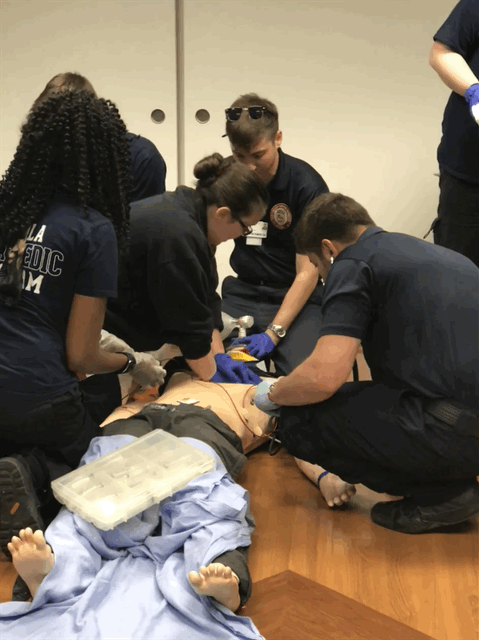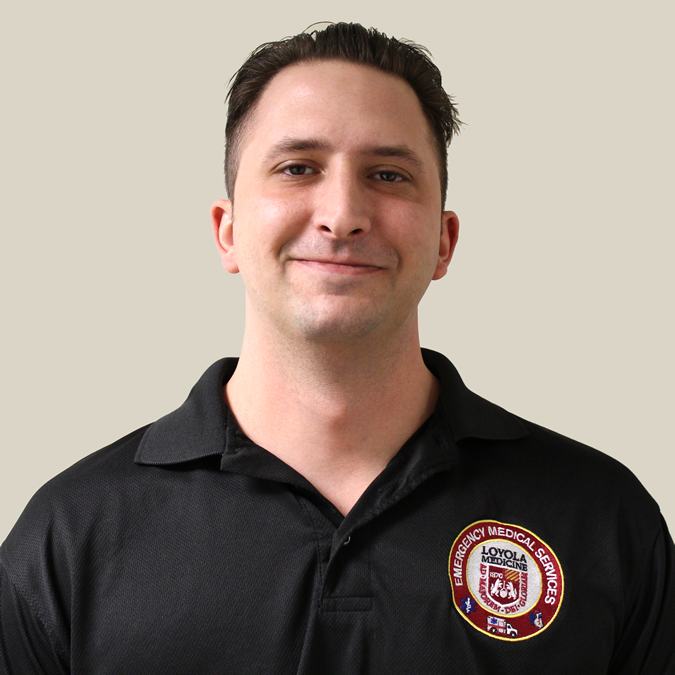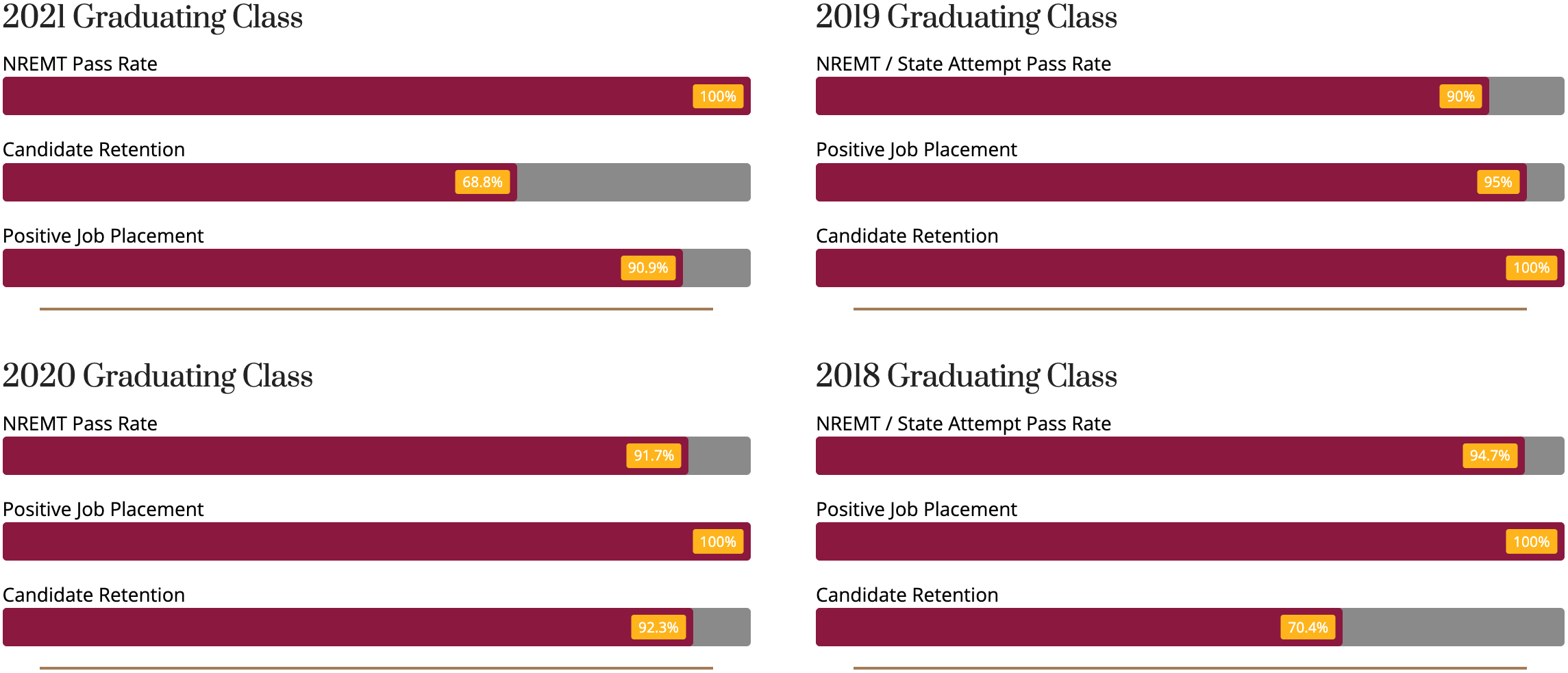Paramedic Academy

The Paramedic, as a part of the healthcare continuum, provides prompt and professional pre-hospital medical treatment to the sick and injured. Under the direction of a medical control physician, the paramedic becomes an extension of the hospital emergency department, seeking to bring quality care directly into the communities in which they serve. The Paramedic is well trained to fulfill the task of rendering advanced lifesaving techniques and to be a resource for healthcare education and safety within the general public.
The Loyola University Medical Center Paramedic Academy is designed for individuals seeking to become professional healthcare providers. Rigorous academics and clinical applications enable students to gain a unique and in-depth experience in emergency health services. The nationally accredited LUMC Paramedic Academy emphasizes that students demonstrate strong interpersonal skills, critical thinking abilities, good decision-making, and the capacity for making quick and appropriate judgments regarding patient care. Upon successful completion of this program, students are well prepared to assume their duties as patient advocates always working to act on behalf of those in need. Students will master the skills necessary to satisfy the requirements of the National Registry of Emergency Medical Technicians and will be eligible for licensure by the State of Illinois Department of Public Health. As professional healthcare providers, Loyola Paramedic graduates are taught to interact effectively with other emergency services personnel, become dynamic leaders, value life-long learning and personal development, serve their communities, and above all, respect and sustain human life.

Joshua Hintz
AAS, CCEMT-P, EMT-P
Lead EMS Instructor
Licensing / CE Specialist
The Loyola University Medical Center’s Paramedic Academy is an 11-month course of study based on the U.S. Department of Transportation’s 2009 National Emergency Medical Services Education Standards for paramedic instruction. This program is designed to provide the student with the cognitive, psychomotor, and affective skills that are essential in performing the duties of a Paramedic. The LUMC Paramedic Academy offers a broad educational experience, utilizing some of the best clinical settings in the Midwest. The course is comprised of formal classroom instruction, a variety of clinical rotations in the medical center and community hospital settings, and a comprehensive field internship with local Fire Departments.
The LUMC Paramedic Academy demands student commitment and dedication to life-long learning. Classes meet three days a week (Tuesday, Wednesday, and Thursday from 0900 to 1700). The course incorporates a variety of teaching methods including lectures, small group activities, student teaching sessions, and skills laboratories. Students are encouraged and supported by their instructors to take responsibility for their learning and to develop a knowledge base that will make them leaders in the Emergency Medical Services field.
The LUMC Paramedic curriculum also includes instruction in the following specialty courses, geared towards creating well-trained, well-rounded paramedics:
- Advanced Cardiac Life Support (ACLS)
- Advanced Medical Life Support (AMLS)
- Advanced Stroke Life Support (ASLS)
- Geriatric Education for EMS (GEMS)
- Pediatric Advanced Life Support (PALS)
- Pediatric Education for Pre-hospital Professionals (PEPP)
- Pre-Hospital Trauma Life Support (PHTLS)
- Tactical Emergency Casualty Care (TECC)
- ICS 100 / 200 / 700 / 800
Upon successful completion of their course of studies, Loyola paramedic candidates are eligible to challenge the National Registry examination for Paramedics (NRP) to gain their licensure as a paramedic by the State of Illinois.
General requirements for acceptance into the LUMC Paramedic Academy are as follows:
- Minimum of 18 years of age
- Current Illinois Department of Public Health (IDPH) EMT licensure
- Current American Heart Association Healthcare Provider CPR/BLS card
- Copy of Valid Driver's License
- Copy of Health Insurance Card
- Transcripts from the highest level of education completed
(high school, associates, bachelors, etc.) - Have completed a college Anatomy & Physiology course (COD Anatomy 1500 or equivalent; Or 1551/1571 and 1552/1572) with a grade of ‘C’ or better within the last 10 years.**
- Have completed a Bio-Medical Terminology course (COD HLTHS 1110 or equivalent) with a grade of ‘C’ or better within the last 10 years.**
(The program reserves the right to inquire about your midterm status if you have not completed an A&P course by the application deadline.) - Letter from employer/supervisor verifying your experience as an EMT
(recommended 6 months minimum) - Two letters of recommendation outlining your strengths
(should be separate from employment verification letter, and not be from relatives)
Acceptance into the LUMC Paramedic Academy is determined by the combined scores of the written exams and a formal interview. Pre-admission testing consists of three exams—a standardized reading comprehension exam, a mathematics exam, and an EMT exam. Applicants who meet or exceed the minimum scores on all three exams and have submitted a complete application packet will be invited to interview with the program director and admissions committee.
** - Due to the ongoing SARS-CoV-2 / COVID-19 pandemic, candidates will be allowed to test without these requirements. However, two (2) preference points will be awarded to candidates who have completed these requirements, one (1) preference point will be awarded to candidates who have these requirements in progress at the time of application.
The Loyola University Medical Center Paramedic Academy is committed to the equitable treatment of students with disabilities. All students must meet the admission requirements. It is the responsibility of the student to identify their specific need and to provide appropriate documentation and evaluations to support the accommodations requested. The program must work within existing resources in attempting to meet the needs of students with disabilities.
2025 Paramedic Academy Information:
January 7th - December 6th, 2025
Tuesdays, Wednesdays, Thursdays (+Scheduled Clinicals)
The application period will open May 1st and close September 1st.
Please contact College of Dupage for applications to the 2025 Academy Class!
Q: Is the application process for the Loyola Paramedic Academy competitive?
A: Based on qualified applicants, combined written test scores, and interviews, our acceptance rate is approximately 20%. The competitive nature of our application process contributes to the outstanding success of our candidates in terms of retention, exam pass rates, and job placement.
Q: How Long is the Paramedic Academy?
A: The program is 11 months, and runs from early January to mid-December.
Q: What does the schedule look like?
A: Candidates are in class Tuesday (Lecture & Skills), Wednesday (Lecture & Skills), and every other Thursday (Simulation & Skills Labs).
Q: How / When do I complete my clinicals?
A: Specific clinical opportunities open up as soon as the content is covered in class (e.g. VAD Clinic, Cath Lab, and CVICU open for sign-up after the cardiology module). Candidates self-schedule clinicals to best fit their schedule within program set parameters.
Q: What clinicals will I complete in the Paramedic Academy?
A: Paramedic Candidates complete several rotations at the following: BLS Ride Time, Emergency Medical Dispatch, Respiratory Therapy, Operating Room, VAD Clinic, Cardiac Cath Lab, Cardiovascular ICU, Medical ICU, Burn ICU, Trauma ICU, Neuro ICU, Labor and Delivery, Neonatal ICU, Pediatric ICU, Triage, Adult Emergency Department, and Pediatric Emergency Department.
Q: Why do Loyola Paramedic Academy Candidates complete so many different clinical rotations?
A: Simply put, it's part of what sets our program apart—Our goal is to create some of the best Paramedics around, and these clinical rotations help candidates become critical thinkers and treat patients with definitive care in mind.
Q: Where do I complete my Field Internship?
A: Candidates will be matched to two separate fire departments within the Loyola EMS system throughout their Capstone Field Internship.
Q: Do I self-schedule my Field Internship?
A: No, Candidates are assigned to a fire department shift (Black Shift, Red Shift, or Gold Shift), and will complete fifteen 12-Hour shifts, and fifteen 24-Hour shifts.
Q: How many hours overall is the Paramedic Academy?
A: Candidates will spend a minimum of 577 Hours in the Classroom / Lab, 256 Hours in Clinical Rotations, and 540 Hours in their Capstone Field Internship.
Q: How much does the Paramedic Academy cost?
A: The Paramedic Academy is billed at the College of DuPage in-district tuition rate for 32 Credits + a $750 Lab Fee.
Q: What does the Lab Fee cover?
A: The Lab Fee covers all course textbooks, your initial set of uniforms, access to Fisdap (our scheduling / charting software), access to practice NREMT exams, and a loaner Chromebook for the year.
Q: What if I have more questions?
A: Please reach out to Oliver Boryszewski (Paramedic Program Director)! We're more than happy to discuss your concerns, and answer any further questions you may have!
Accreditation Statement
Continually since 1995, The Loyola University Medical Center Paramedic Academy is accredited by the Commission on Accreditation of Allied Health Education Programs (www.caahep.org) upon the recommendation of the Committee on Accreditation of Educational Programs for the Emergency Medical Services Professions (CoAEMSP).
Commission on Accreditation of Allied Health Education Programs
9355 - 113th St. N, #7709
Seminole, FL 33775
727-210-2350
www.caahep.org
To contact CoAEMSP:
8301 Lakeview Parkway Suite 111-312
Rowlett, TX 75088
214-703-8445
Fax: 214-703-8992
www.coaemsp.org

Institutional Affiliation
The Loyola University Medical Center Paramedic Academy maintains an institutional affiliation/partnership with the College of DuPage (CoD), which awards the Paramedic Candidate upon successful completion of the training program, the Paramedic Certificate, and 36 college credits toward the Associate of Applied Sciences (AAS) Degree in Emergency Medical Services (https://catalog.cod.edu/programs-study/fire-science/emergency-medical-services-aas/).
In addition, our affiliation with CoD provides Candidates access to veterans benefits, financial aid, counseling. More information can be found on the College of DuPage Website (https://COD.edu/ems).
